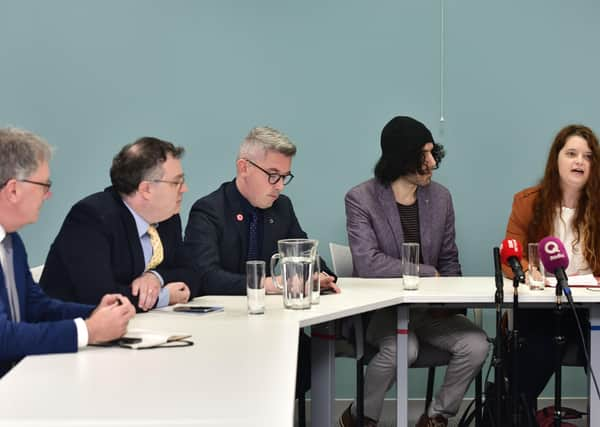Owen Polley: British and Irish identities may be equally valid in Northern Ireland but it will be an outrage if UK and Irish citizenship get equal status


Emma DeSouza claims that the Belfast Agreement means she should not be considered a citizen of the UK.
Her husband applied for permission to remain in the country permanently through a scheme intended for the spouses of non-British EU citizens.
Advertisement
Hide AdAdvertisement
Hide AdDeSouza had the option of formalising her husband’s right to stay by acknowledging her UK citizenship or revoking it formally, in order to avail of the EU scheme, but she chose to take to the courts instead.
The case forms a perfect example of the nationalist tactic of confusing matters of identity and sovereignty.
DeSouza cited a provision of the Belfast Agreement that recognises, “the birthright of all the people of Northern Ireland to be recognised as Irish or British or both, as they may so choose.”
The rest of the paragraph states that “their right to hold British and Irish citizenship is accepted by both governments and would not be affected by any further change in the status of Northern Ireland.” (My emphasis).
Advertisement
Hide AdAdvertisement
Hide AdImportantly, the clause doesn’t set out a right to hold British or Irish citizenship, because that was never the intention of the agreement’s signatories.
This point was emphasised in a judgement of the Upper Tribunal, which ruled against DeSouza last October.
“If the parties to the multi-party agreement and the governments of Ireland and the United Kingdom had intended the concept of self-identification ... to include a person’s ability to reject his or her British or Irish citizenship,” the judge ruled, “it is inconceivable that the provisions would not have dealt with this expressly.”
Though DeSouza’s campaign was never likely to force a change of citizenship law through the courts, the government decided to change the immigration rules in response.
Advertisement
Hide AdAdvertisement
Hide AdWhether or not people from Northern Ireland hold British or joint British and Irish citizenship, their spouses can now apply for leave to remain under the EU scheme.
This concession probably derailed the legal case, but political pressure to end automatic British citizenship for people here is likely to continue.
Recently, there was a snapshot of the mindset that feeds the campaign, when DeSouza reprimanded East Belfast MP, Gavin Robinson, for “seeking to place a British identity above that of an Irish identity”.
Of course, Mr Robinson did nothing of the sort.
He merely explained that the Belfast Agreement affirms that the right of Irish citizenship available to the people of Northern Ireland is “in addition to British citizenship not instead of it”.
Advertisement
Hide AdAdvertisement
Hide AdThe British and Irish identities may be equally valid in Northern Ireland, but it would be an outrage if British and Irish citizenship were on an equal footing.
Most of the people who are born here are deemed British citizens automatically because citizenship is linked to sovereignty and this province is part of the United Kingdom.
Contrary to popular belief, the Belfast Agreement did not create an entitlement to Irish citizenship in Ulster.
The government in Dublin dispensed passports outside its territory long before 1998.
Advertisement
Hide AdAdvertisement
Hide AdThe reason was its irredentist ambition to absorb Northern Ireland.
Nationalists have consistently tried to get around the ‘principle of consent’ that preserves our place in the United Kingdom by implying that the symbols and institutions of the Republic of Ireland share ‘parity of esteem’ with their British equivalents.
They portray the consequences of the UK’s sovereignty in Northern Ireland as examples of unfair treatment or inequality for the Irish identity.
Traditionally, unionists have been alert to these tactics, but they’ve acquired a dangerous new potency with the arrival of modern identity politics on these shores.
Advertisement
Hide AdAdvertisement
Hide AdDeSouza describes the requirement to acknowledge her British citizenship as a ‘trauma’.
The natural response might be to laugh at such over-sensitivity, but it exemplifies the so-called ‘millennial’ generation’s obsessions with identity.
Many young people seem fixated on the idea that an individual has a supposed right to express their innermost selves as they see fit and have that self-identification recognised by society without question or qualification.
DeSouza’s campaign found the perfect pressure point for naive young unionists (and for old fools trying to prove how ‘progressive’ they are).
Advertisement
Hide AdAdvertisement
Hide AdIt’s good news that nationalists’ attack on British citizenship in Northern Ireland through the law courts has come to an end.
Perhaps now the campaign will lose its potency, but that doesn’t mean genuine unionists should become complacent.
They still need to calmly but insistently point out the difference between citizenship and identity, and the difference between identity and sovereignty.